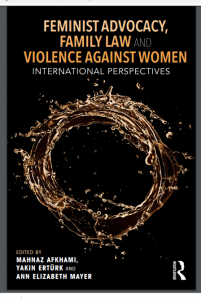SPACES FOR CHANGE is one of the contributing authors to the global study, Feminist Advocacy, Family Law & Violence Against Women: International Perspectives, published by Routledge Books (Taylor and Francis Group). The October 22, 2019 public launch of the report at the Nigerian Institute of Advanced Legal Studies, University of Lagos, Nigeria, brought together academics, feminists, activists, journalists, students, researchers, human rights advocates and community women leaders under one roof to examine the dominant influences and factors militating against the success of policy and legislative reforms on gender-based violence.
Women’s Learning Partnership (WLP) and CEADER commissioned the study in 2016 to interrogate and demonstrate the linkages between discriminatory family laws and violence against women. The book provides case studies from Brazil, India, Iran, Lebanon, Nigeria, Palestine, Senegal, and Turkey, using them to demonstrate in each case, the varied history of family law and the wide variety of issues impacting women’s equality in legislation. The Nigerian case study, in Chapter 7 of the book, examines why gender equality lags behind despite legal reform.
Presenting the Nigerian case study to the audience, SPACES FOR CHANGE’s Victoria Ibezim-Ohaeri explained that the study adopted an advocacy stance whereby findings reveal the extent of, and quality of legal protection women and girls enjoy in Nigeria’s two major regions, highlighting new opportunities for reform. The study proceeds on the premise that there are linkages between the laws regulating relations in the family and violence against women. In establishing the connection between family law and VAW, she sketched the historical developments in family law reform, particularly since the post-Independence era when the country began the process of transforming inherited colonial structures into truly localized administrative and governance frameworks reflective of local political realities and cultural priorities. This provides a context in which to examine and understand the disparate legislative architecture as well as the socio-cultural attitudes which influence both gender hierarchy and the phenomenon of violence against women in Nigeria.
The progress in implementation of the legal reforms has been slow, prompting many to question whether the array of constitutional and legislative prescriptions of substantive equality actually translate to locally-enforceable guarantees at the state, national and international levels. No doubt the reform of laws impacting women in the family has neither overturned the disproportionate ways cultural norms affect women, nor uprooted the ingrained patriarchal ideologies that lower women’s status and decrease their autonomy. The result is an upsurge in the nature and scope of the systematic patterns of gender-based violence witnessed across the two regions. However, this is not all. Behind these obstacles constraining the enjoyment of women’s rights lie many more opportunities for reform. This research explores those untapped opportunities, unpacking the process and dynamics of reform itself, allowing the extraction of a wide range of potential lessons for future reformers.




